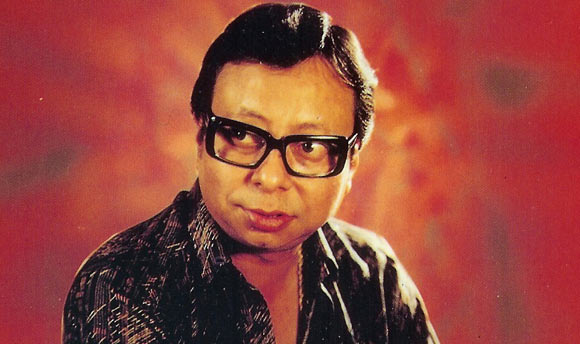
R. D. Burman (short-form for Rahul Dev Burman) was an incredibly fecund music director in the Bollywood film industry of the 1970s and 1980s. He was born to the famous Sachin Dev Burman in Kolkata, India on the 27 June 1939. In his early school years, Burman demonstrated tremendous skill in lyrical composition, contributing a number of songs for his father’s films at the age of nine. Before the age of 20, and quickly gaining independent acclaim in the Indian film industry, Burman played harmonica and other mouth organs for several of his father’s works, and was casted as supporting musical director in a number of films such as Chalti Ka Naam Gaadi (1958), Kaagaz Ke Phool (1959), Tere Ghar Ke Samne (1963) and Teen Devian (1965).
In the early stages of Burman’s career, offers from hit film directors seldom came his way. He mainly restricted his talents to the household and had no real intention to pursue a career in music. However, after being approached by director Mehmood Ali for his film Chhote Nawab (1961), Burman first began considering the prospects of a full-fledge musical career. Under Burman’s tutelage, rising stars such as Mohammad Rafi and Majrooh Sultanpoori worked on Teesri Manzil (1966), Burman’s first ever independently-composed film. Meanwhile, he was also working on side scores with his father on films such as Jewel Thief (1967). In the early 1970s, Burman came in close contact with Lata Mangashkar, and together with singers like Asha Bhosle, supervised the musical score of Kati Patang (1970). After a well-rounded reception for this project, Burman worked on a number of blockbusters, such as Hare Rama Hare Krishna (1971), Buddha Mil Gaya (1971), Caravan (1971) and Amar Prem (1972). These films featured songs like Dum Maro Dum and Raina Beeti Jaaye, in the voices of Bhosle and Mangeshkar respectively, which become instant hits throughout the music scene in Bollywood. His artsy vibe played a pivotal role in compositions for more films of this period, such as Yaadon Ki Baaraat (1973), Aap ki Kasam (1974), Sholay (1975) and Aandhi (1975). It seemed clear that Burman’s approach to musical aura in the Bollywood industry was clicking well with other musicians and composers. He worked on a number of other monumental film scores like Hum Kisise Kum Naheen (1977), Ghar (1978), Gol Maal (1979) and Khubsoorat (1980). Perhaps the soundtrack that came out to be on top was the one composed for Sanam Teri Kasam (1981), which won him the Best Music Director Award.
Like many other great composers, however, R. D. Burman fell prey to changing musical dimensions in the late 1980s. Despite this unfortunate change, Burman’s approach to composition, his skill to merge several cultural genres and his endless passion for music itself helped several other prominent artists to rise up to the popular Bollywood scene, such as Kumar Sanu and Mohammad Aziz. Burman’s style of compositional development was an evolutionary one, which defied all contemporary and conservative stagnancies that existed in the film industry of the 1970s. He introduced several dimensions of electronic rock music to the film layouts, merging it well with Bengali and traditional receptions that were engraved in the local minds in Bollywood. He also featured some unconventional methods to produce music in songs like Mehbooba Mehbooba and Churaliya Hai, completely negating the stereotypes against music directors who preferred thinking outside the box. R. D. Burman died in Mumbai, India on the 4 January 1994, leaving an indelible and unparallel mark on the potential of the Bollywood music stage.